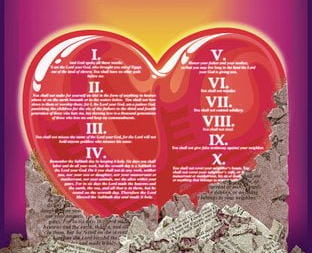Lesson 9, November 20-26
Sabbath Afternoon
Memory Text: “But if from thence thou shalt seek the Lord thy God, thou shalt find him, if thou seek him with all thy heart and with all thy soul.”
Deuteronomy 4:29
A simple fact of life follows us all: we are sinful. Occasionally we hear some “expert” bemoan the Christian idea of basic human corruption, but all one has to do is look at the news for a day or so or take a quick survey of human history, and the truthfulness of this Christian doctrine becomes apparent.
Or, even easier, all one has to do is look in the mirror; not that far, actually. Whoever has the courage to take a long look deep inside one’s own heart (which can be a scary place to go) knows the truthfulness of
Romans 3:9-23, which ends with the words: “For all have sinned, and come short of the glory of God” (
Romans 3:23).
Of course, the good news is found in the next verse, about being “justified freely by his grace through the redemption that is in Christ Jesus” (
Romans 3:24). Crucial to this great news is repentance: acknowledging our sin, being sorry for it, asking God’s forgiveness for it and, ultimately, turning away from it. Because we are sinful, repentance should be a central part of our Christian existence. And, this week, we will see the idea of repentance as expressed in Deuteronomy.
Sunday, November 21
Mi-yitten
Biblical Hebrew, like most languages, is sprinkled with idioms, when specific words are used to mean something different from what they actually say. One idiom in the Old Testament is “Mi-yitten.” “Mi” is the question “who?” and “yitten” means “will give.” So, literally, “Mi-yitten” is “Who will give?”
In the Old Testament, however, the phrase expresses the idea of a wish, of a desire, of someone wanting something badly.
For instance, after their escape from Egypt, the children of Israel, facing challenges in the wilderness, exclaimed, “Would to God we had died by the hand of the Lord in the land of Egypt” (
Exodus 16:3). The phrase “Would to God” came from “mi-yitten.”
In
Psalm 14:7 David utters, “Oh that the salvation of Israel were come out of Zion!” The Hebrew doesn’t say “Oh”; it says “mi-yitten.”
In
Job 6:8, when he exclaims, “Oh that I might have my request;” — “Oh” is, again, from “mi-yitten.”
Read
Deuteronomy 5:22-29, focusing especially on verse 29. What does it mean that the word translated as “Oh” comes from “mi-yitten”?
Here is the Lord — the Creator God, the One who made space, time, and matter, the One who spoke our world into existence, the One who breathed into Adam the breath of life — uttering a phrase generally associated with the weaknesses and limitations of humanity. What an example of the reality of free will! Here we see that there are limits to what God can do in the midst of the great controversy. This use of “mi-yitten” reveals that even God can’t trample on free will; for the moment He did, it would no longer be free.
And just as we humans are free to sin, we are also free to choose the Lord, to choose to be open to His leading, to choose, by responding to His Spirit, to repent from our sins and to follow Him. Ultimately the choice is ours, and ours alone, and it is a choice that we have to make day by day, moment by moment.
What are some of the choices that you are going to face in the next few hours or few days? How can you learn to surrender your will to God so that, in His strength, you can make the right choices?
Monday, November 22
Seek Me and Find Me
All through the Bible we find evidence of God’s foreknowledge. That is, He knows beforehand all that will happen. Whether the rise and fall of world empires (Daniel 7) to individual actions just hours before they occur — “Verily I say unto thee, That this night, before the cock crow, thou shalt deny me thrice” (
Matthew 26:34) — the Lord knows the end from the beginning. His foreknowledge, even of our free choices, has no bearing whatsoever on the freedom of those choices.
Thus, the Lord knew, even before He brought the children of Israel into the land, what they would do when in the land.
Read
Deuteronomy 4:25-28. What did the Lord say that the people would do after they had been in the land promised them?
In the verses before, the Lord tells them specifically not to make idols and not to worship them (
Deuteronomy 4:15-20). Yet, the following verses pretty much say that making idols and worshiping them is exactly what they are going to do, despite all the warnings.
Notice that in
Deuteronomy 4:25, Moses is clear that it won’t happen immediately. After all that they just had experienced, they weren’t likely to fall into idolatry right away. However, over time, after a generation or so, the tendency to “forget” (
Deuteronomy 4:9) what the Lord had done for them, and what He had warned them against, would lead them to do exactly what He warned against.
Read
Deuteronomy 4:29-31. What does the Lord say He will do for them in this specific situation?
God’s grace is amazing. Even after they fall into the horrific evil of idolatry, even after they have received the due consequences of their sins, if they turn to the Lord, He will forgive them and restore them. In short, if they freely choose to repent, He will accept their repentance.
The word in
Deuteronomy 4:30, often translated “turn,” really means “to return.” That is, they are going back to the Lord, to where they were supposed to have been all along. The Hebrew word teshuvah, from that same root word for “to return,” means “repentance.”
Thus, at the core, whatever else is involved in repentance, it is a return to God after we have been separated from Him by our sins.
Tuesday, November 23
Teshuvah
All through the book of Deuteronomy, a key theme appears: obey the Lord and be blessed, disobey and you will suffer the consequences. It’s no different in the New Testament. “Be not deceived; God is not mocked: for whatsoever a man soweth, that shall he also reap. For he that soweth to his flesh shall of the flesh reap corruption; but he that soweth to the Spirit shall of the Spirit reap life everlasting” (
Galatians 6:7-8).
Unfortunately, at least after the Fall, sin seems as easy and as natural as breathing. And despite all the warnings and promises — “For this commandment which I command thee this day,
lit is not hidden from thee, neither is it far off” (
Deuteronomy 30:11) — many of the people did precisely that: they fell into the sins that God had warned them about.
And yet, even then, God was willing to take them back if, using their free will, free choice, they repented and returned to Him.
Read again
Deuteronomy 30:1-10. What is the Lord saying He will do for His people, despite all the wrong that they have done? What, though, was the condition upon which these wonderful promises rested?
The idea is simple and straightforward: if you mess up, terrible consequences will result for you and your family. That’s what sin does. However, even then, you can repent, and the Lord will take you back and bless you.
Numerous times the same Hebrew root word behind teshuvah appears in these verses. In
Deuteronomy 30:2, the text says “And shalt return unto the Lord thy God”; in
Deuteronomy 30:8), though it is often translated, and correctly so, “thou shalt return and obey the voice of the Lord,” it could be translated literally, “And you return and obey the voice of the Lord.” Finally, in
Deuteronomy 30:10, where it reads “and if thou turn unto the Lord thy God with all thine heart, and with all thy soul,” again the word “turn” is really “return.”
In other words, despite all that happened to them, despite their utter violation and breaking of the covenant, the Lord was not through with these people, and if they didn’t want Him to be through with them, they could manifest that desire by repentance.
Though dealing with the nation as a whole, how do these texts, despite the different context from us today, still reflect the reality of how central true repentance is to us as believers who, at times, violate the covenant we have made with God, as well?
Wednesday, November 24
With All Your Heart
Deuteronomy 30:1-10 reveals the grace and goodness of God for backsliders and sinners, even when those sinners and backsliders were previously blessed by God in unique ways: “For what nation is there so great, who hath God so nigh unto them, as the Lord our God is in all things that we call upon him for?” (
Deuteronomy 4:7). Even despite all that He had done for them, and despite the fact that they had no real excuse or justification for their sin, they sinned anyway (can anyone relate?).
And yet, even then — what?
In
Deuteronomy 30:1-10, focus on what their repentance, their returning (teshuvah) to God entailed. What was required, and what should that teach us today about what true repentance involves?
Ultimately, they had to make the choice to return to Him, and to obey Him, with all their hearts. In one sense, the real issue was their hearts, because if their hearts were right with God, their actions would follow: that is, they would be obedient.
This is why they were given the wonderful promise that if they “returned” to the Lord, sincerely turned to Him, then He would work in them and would “circumcise” their hearts. They have to make the choice, amid their captivity, to return to God, and He would then bring them back to Himself and to the land. And then there, in the land, He would bless them. And part of the blessing is that He would work in them to change their hearts even more toward Him, so that they and their children would “love the LORD your God with all your heart and with all your soul, that you may live.”
In the end, responding to the promptings of God (see
Acts 5:31), they would have to truly repent of their sins. And, although dealing with a different historical context, Ellen G. White wrote: “The people mourned because their sins had brought suffering upon themselves, but not because they had dishonored God by transgression of His holy law. True repentance is more than sorrow for sin. It is a resolute turning away from evil.” —
Patriarchs and Prophets, p. 557. And this is a truth that we can see in
Deuteronomy 30:1-10.
How can we know the difference between being sorry for the consequences of our sins, which anyone can do, and being sorry for the sins themselves? Why is this distinction so important?
Thursday, November 25
Repent and Be Converted
The New Testament, of course, is filled with the idea of repentance. In fact, John the Baptist began his ministry with the call to repentance.
Read
Matthew 3:1-8. How does the idea of “return” appear in these verses? In other words, what is John the Baptist telling them to do that reflects what was found in Deuteronomy? Why, also, would his words have special relevance for the Pharisees and Sadducees?
Jesus, too, began His ministry with calls for repentance.
Read
Mark 1:15. What does Jesus say, and why does He relate repentance with the gospel?
Whether it be John the Baptist talking specifically to the religious leaders or Jesus to the nation as a whole, the idea is the same. We are sinners, and though Christ came to save sinners, we must repent of our sins. And that repentance — whether as a backslider or as a faithful Christian who falls into sin or as a new convert — includes a turning from our old sinful ways. We must acknowledge our sinfulness and, expressing repentance for our sins themselves (and not just the consequences of them), we must make the conscious choice to put away those sins and, relying wholly on the merits of Jesus, “hearken unto the voice of the Lord thy God” (
Deuteronomy 15:5).
Some biblical scholars see in the New Testament echoes of the idea of repentance as expressed in Deuteronomy. For example, when Peter accuses the nation of having crucified Jesus, many of the people “were cut to the heart, and said to Peter and the rest of the apostles, ‘Men and brethren, what shall we do?’” (
Acts 2:37). That is, being aware of their sin, they were sorry for it (“pricked in their heart”), and they wanted to know what they should do now to be right with the God whom they had offended.
Is this not pretty much the same situation as with all of us: sinners who have offended God?
Read
Acts 2:38. How did Peter respond to their question, and how does this episode reveal the principle behind true repentance?
Friday, November 26

Further Thought: “At every advance step in Christian experience our repentance will deepen. It is to those whom the Lord has forgiven, to those whom He acknowledges as His people, that He says, ‘Then shall ye remember your own evil ways, and your doings that were not good, and shall loathe yourselves in your own sight.’
Ezekiel 36:31. Again He says, ‘I will establish My covenant with thee, and thou shalt know that I am the Lord; that thou mayest remember, and be confounded, and never open thy mouth any more because of thy shame, when I am pacified toward thee for all that thou hast done, saith the Lord God.’
Ezekiel 16:62,
63. Then our lips will not be opened in self-glorification. We shall know that our sufficiency is in Christ alone. We shall make the apostle’s confession our own. ‘I know that in me (that is, in my flesh) dwelleth no good thing.’
Romans 7:18. ‘God forbid that I should glory, save in the cross of our Lord Jesus Christ, by whom the world is crucified unto me, and I unto the world.’
Galatians 6:14.”
Christ’s Object Lessons, pp. 160
“‘The goodness of God leadeth thee to repentance.’
Romans 2:4. A golden chain, the mercy and compassion of divine love, is passed around every imperiled soul. The Lord declares, ‘I have loved thee with an everlasting love; therefore with lovingkindness have I drawn thee.’
Jeremiah 31:3.”
Christ’s Object Lessons, p. 202
Discussion Questions:
Though we must repent, how can we be careful to avoid the trap of making repentance as something meritorious, as if the act of repenting itself is what makes us right before God? What is the only way we can be right before God?
“Then Judas, which had betrayed him, when he saw that he was condemned, repented himself, and brought again the thirty pieces of silver to the chief priests and elders, Saying, I have sinned in that I have betrayed the innocent blood. And they said, What is that to us? see thou to that. And he cast down the pieces of silver in the temple, and departed, and went and hanged himself” (
Matthew 27:3-5). No doubt Judas was sorry for what he did to Jesus (after all, he killed himself). Why, though, are his actions not deemed as true repentance?
How should the reality of human sinfulness, even our own sinfulness, keep us humble before others (in that we don’t judge them) and before God? Why should the fact that it took the cross, i.e., the death of the Son of God, to save us, to show us just how bad sin really is?

























